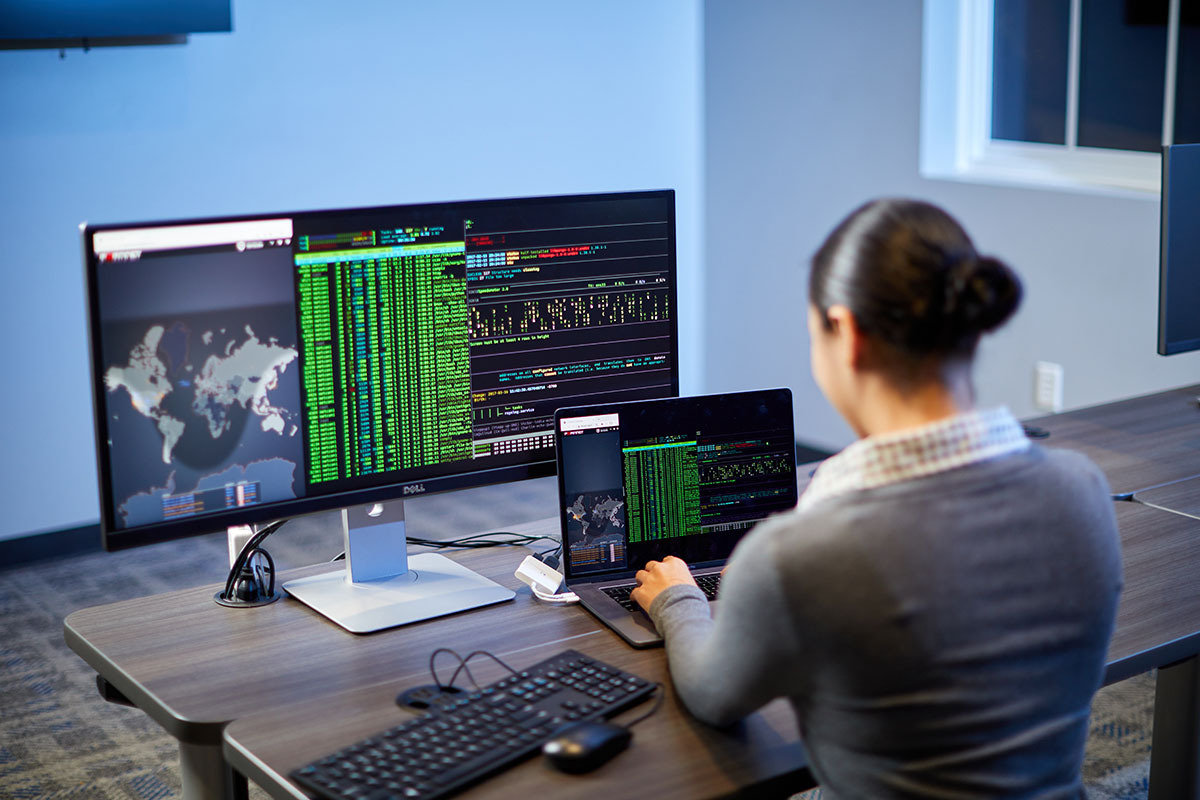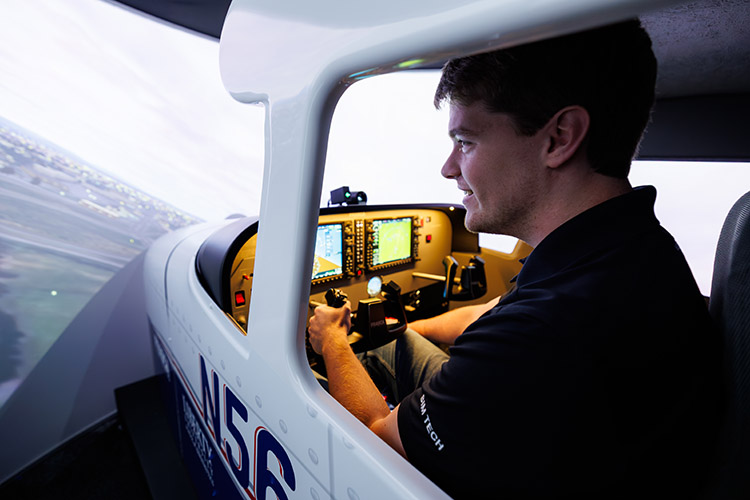Liberty addresses cybersecurity workforce gap through Center for Cyber Excellence
October 31, 2023 : By Christian Shields - Office of Communications & Public Engagement
As the country continues to face a shortage of qualified cybersecurity professionals, the Liberty University School of Business looks to meet workforce demands through its Center for Cyber Excellence.

The university offers degrees at the undergraduate and graduate levels in the areas of information systems, information technology, and computer science. It boasts designation as a National Center of Academic Excellence in Cyber Defense Education for its B.S. in Information Technology with Data Networking and Security by both the National Security Agency (NSA) and the Department of Homeland Security.
With a current national cybersecurity workforce gap of 500,000 and a global workforce gap of over 4 million, Computer Science Professor Richard Bansley, executive director of the Center for Cyber Excellence, said proper training along with opportunities to gain hands-on experience in the craft are essential. He said while some universities tend to view cybersecurity as solely a computer science problem and seek to solve future issues through computer programing, others view the situation as an overall information technology problem and seek to fix the issue by correcting current operating systems. Liberty takes an approach that aims to rectify both.
“At Liberty University, we are trying to train up students to go out into the world to solve tomorrow’s problems by designing more secure software and hardware systems that will be deployed in the future,” he said. “In the meantime, we are graduating students who are trained to solve today’s problems implementing the current technology securely.”
The center is accomplishing this through both practical experience in the classroom, training students to become proficient in ensuring the confidentiality, availability, and integrity of data and teaching them how to preserve and restore systems by developing risk management skills, as well as outside the classroom through official competition teams.
The Center for Cyber Excellence has doubled its number of teams to six this year. Students participate in competitions across the country, performing tasks in a simulated stress-filled environment that mimics a real-life cybersecurity situation.

“(The competitions are) similar to the intensity that you would find in a one-week intensive or capstone course where students are staying up late, they’re working as a team, they’re hammering it out,” said Ben Johnston, a business technologist who works with the competition teams. “It’s very intense. They learn a great deal in a really short amount of time and benefit from that personally, but then bring it back to the Cyber community here at LU. That’s been really fruitful.”
So far this semester, teams have entered three competitions: Hack the Universe, Collegiate Penetration Testing, and Hivestorm. This is the first time Liberty has competed in a Hack the Universe event; a team attended “Hack the Hospital” Sept. 18-22 in Columbia, Md., where they were tasked with defending against a simulated cyberattack at a hospital.
Liberty finished second at CPTC Central Regionals on Oct. 14. Several cyber teams also competed in Hivestorm, helping Liberty finish in the top 10 percent in the pool of over 200 teams.
In addition to these competitions, Liberty also participates in the Collegiate Cyber Defense Competition (CCDC), the Meta Capture the Flag competition, the Cyber Fusion competition, the National Centers of Academic Excellence in Cybersecurity (NCAE-C) competition. Both the NCAE-C and the Cyber Fusion competitions are staffed by Liberty Cyber Club to increase new student participation and help lessen the workload of upperclassmen.
Bansley plans to add official Hivestorm (for members of the CCDC) and Cyber Force (Hack the Universe team will compete) competition teams in the future and estimates that these will result in a total of at least 40 students on competition teams every year.
In addition to competitions, Liberty also empowers its students through partnerships with organizations such as the NSA and the U.S. Department of Defense. The School of Business currently offers a scholarship through a partnership with the DoD to select students that provides them with additional opportunities to gain experience in the cybersecurity world. The center also supports co-op programs with the NSA that allow students to work for the organization before graduation.

Liberty is also connecting with state and federal entities to provide them with access to Liberty’s excellent cyber resources such as the cyber range, which allows the cyber program to distribute virtual lab environments to students and other users that simulates real computer systems. The cooperative efforts not only benefit the entities, but result in opportunities for students to train alongside cybersecurity professionals.
“We are looking at ways to use the resources we have been blessed with to help others get more cybersecurity expertise and training options,” Bansley said.
As the School of Business continues to educate the next generation of cyber professionals, it does so in light of its mission to Train Champions for Christ. Bansley said reading the “Left Behind” book series, which features a character who uses computer intelligence to help new believers, showed him the importance of having Christians in the field.
“When I read that book, I concluded that there’s no one better prepared to do cybersecurity than Christians because they have a higher standard of ethical conduct and behavior and a higher authority that doesn’t change over time based on cultural influence. I also concluded that no one will need cybersecurity more than Christians,” he said, acknowledging that ministries and missions organizations around the world need proper cybersecurity to be effective.
Liberty incorporates ethics into all of its computer science courses, reinforcing the importance of taking care of the resources God has provided to humanity by being a good steward as well as a good shepherd. Through its various degree programs and competition teams, the university stands ready to equip students to impact the global cybersecurity community.


